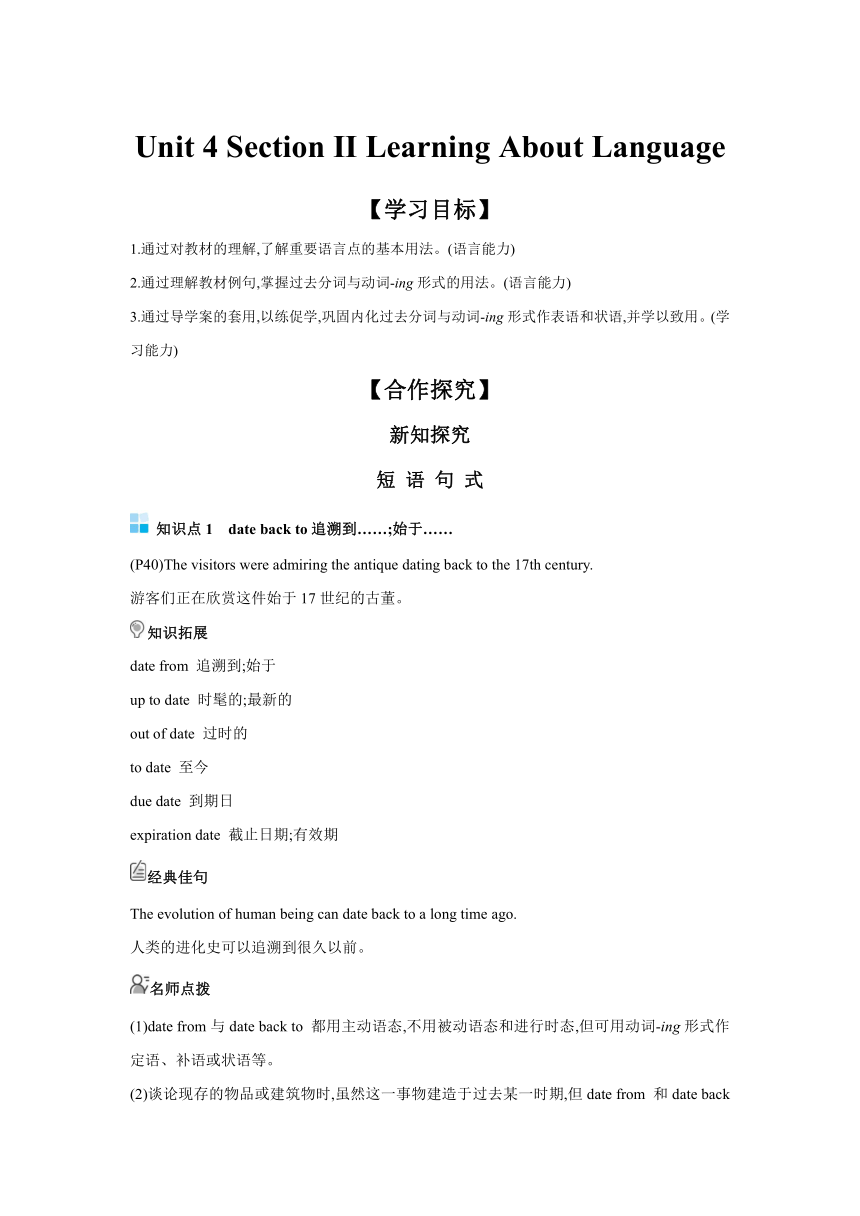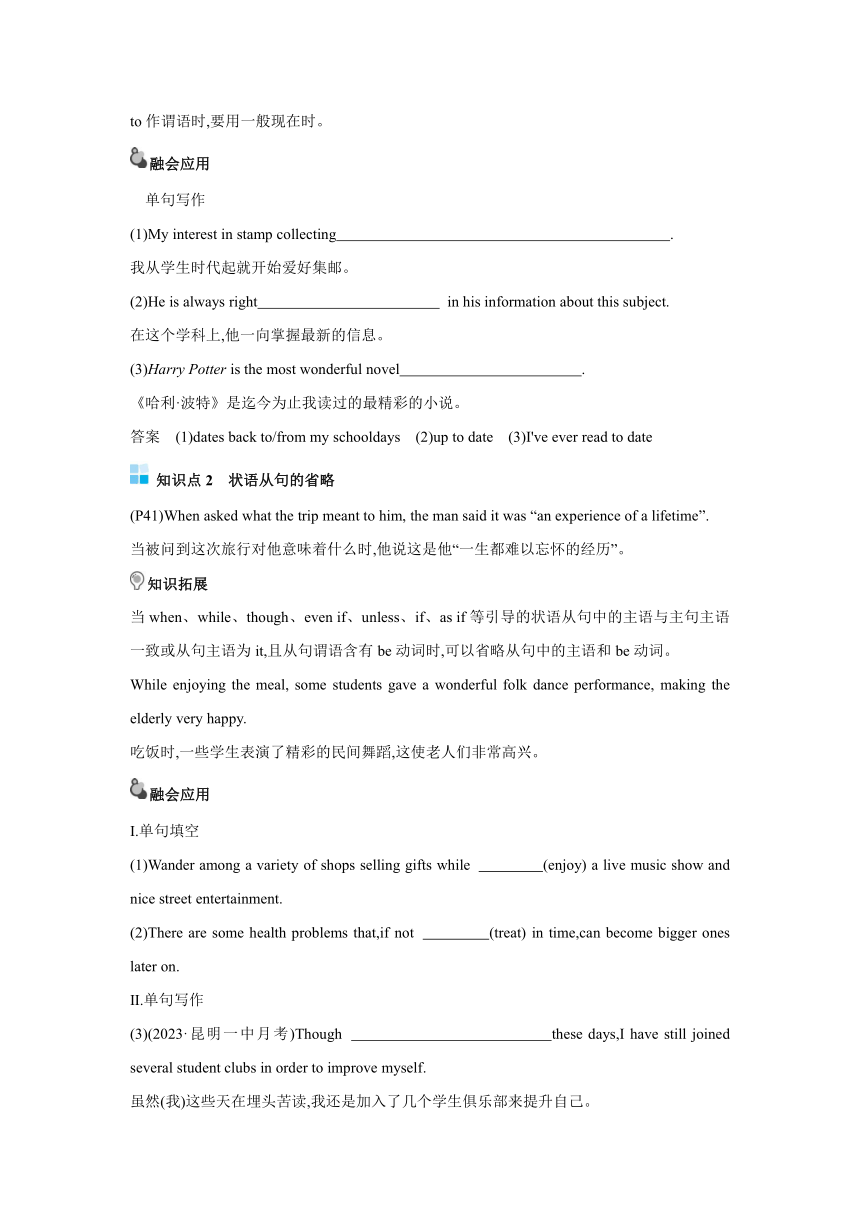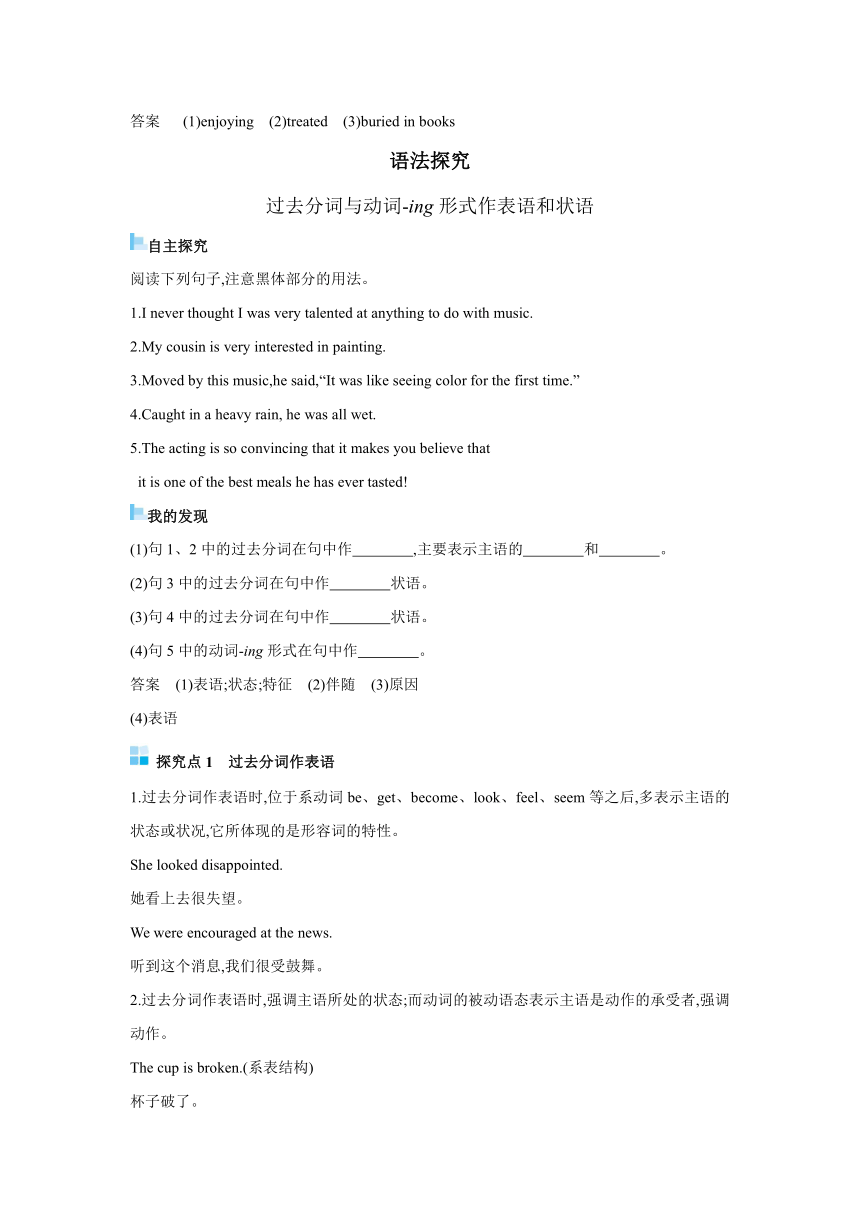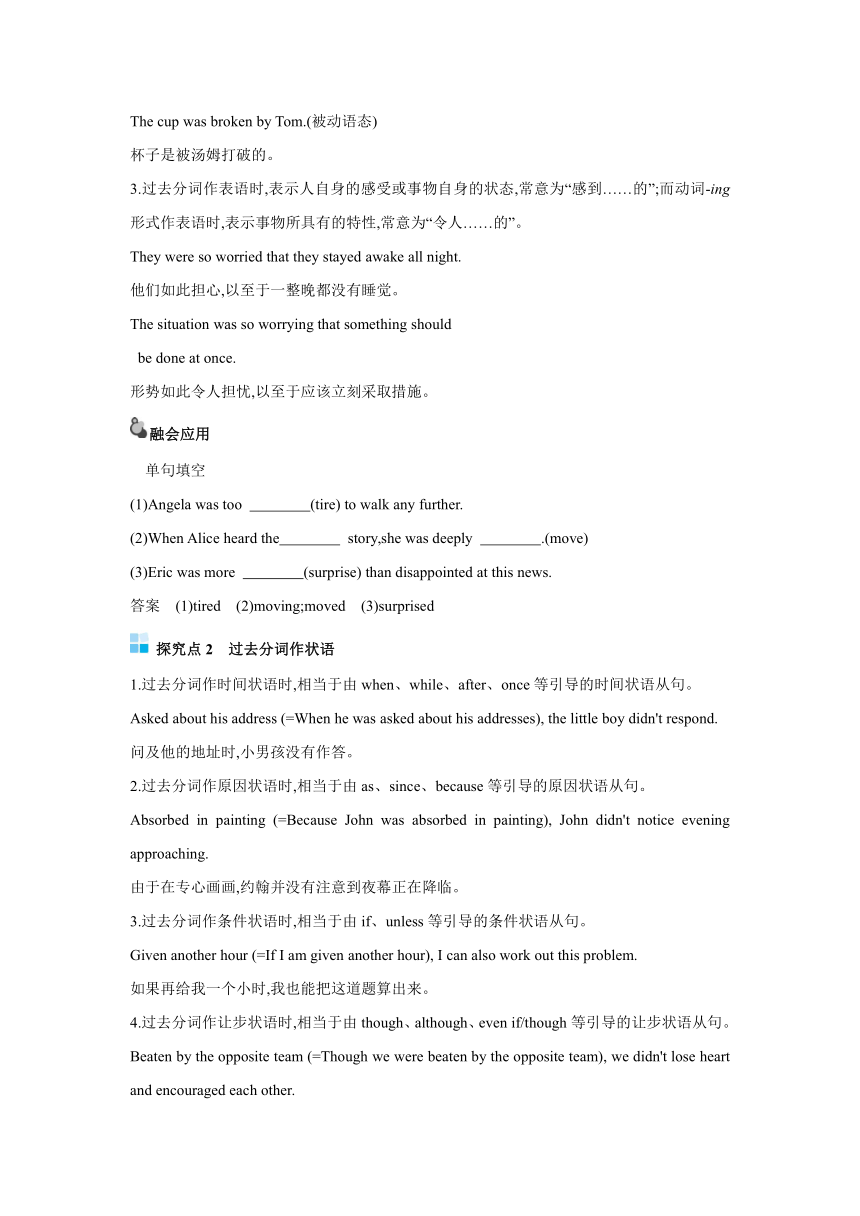人教版(2019)选择性必修 第二册Unit 4 Journey Across a Vast Land Learning About Language 学案(含答案)
文档属性
| 名称 | 人教版(2019)选择性必修 第二册Unit 4 Journey Across a Vast Land Learning About Language 学案(含答案) |  | |
| 格式 | docx | ||
| 文件大小 | 43.5KB | ||
| 资源类型 | 教案 | ||
| 版本资源 | 人教版(2019) | ||
| 科目 | 英语 | ||
| 更新时间 | 2024-04-07 17:19:58 | ||
图片预览




文档简介
Unit 4 Section Ⅱ Learning About Language
【学习目标】
1.通过对教材的理解,了解重要语言点的基本用法。(语言能力)
2.通过理解教材例句,掌握过去分词与动词-ing形式的用法。(语言能力)
3.通过导学案的套用,以练促学,巩固内化过去分词与动词-ing形式作表语和状语,并学以致用。(学习能力)
【合作探究】
新知探究
短 语 句 式
知识点1 date back to追溯到……;始于……
(P40)The visitors were admiring the antique dating back to the 17th century.
游客们正在欣赏这件始于17世纪的古董。
知识拓展
date from 追溯到;始于
up to date 时髦的;最新的
out of date 过时的
to date 至今
due date 到期日
expiration date 截止日期;有效期
经典佳句
The evolution of human being can date back to a long time ago.
人类的进化史可以追溯到很久以前。
名师点拨
(1)date from与date back to 都用主动语态,不用被动语态和进行时态,但可用动词-ing形式作定语、补语或状语等。
(2)谈论现存的物品或建筑物时,虽然这一事物建造于过去某一时期,但date from 和date back to作谓语时,要用一般现在时。
融会应用
单句写作
(1)My interest in stamp collecting .
我从学生时代起就开始爱好集邮。
(2)He is always right in his information about this subject.
在这个学科上,他一向掌握最新的信息。
(3)Harry Potter is the most wonderful novel .
《哈利·波特》是迄今为止我读过的最精彩的小说。
答案 (1)dates back to/from my schooldays (2)up to date (3)I've ever read to date
知识点2 状语从句的省略
(P41)When asked what the trip meant to him, the man said it was “an experience of a lifetime”.
当被问到这次旅行对他意味着什么时,他说这是他“一生都难以忘怀的经历”。
知识拓展
当when、while、though、even if、unless、if、as if等引导的状语从句中的主语与主句主语一致或从句主语为it,且从句谓语含有be动词时,可以省略从句中的主语和be动词。
While enjoying the meal, some students gave a wonderful folk dance performance, making the elderly very happy.
吃饭时,一些学生表演了精彩的民间舞蹈,这使老人们非常高兴。
融会应用
Ⅰ.单句填空
(1)Wander among a variety of shops selling gifts while (enjoy) a live music show and nice street entertainment.
(2)There are some health problems that,if not (treat) in time,can become bigger ones later on.
Ⅱ.单句写作
(3)(2023·昆明一中月考)Though these days,I have still joined several student clubs in order to improve myself.
虽然(我)这些天在埋头苦读,我还是加入了几个学生俱乐部来提升自己。
答案 (1)enjoying (2)treated (3)buried in books
语法探究
过去分词与动词-ing形式作表语和状语
自主探究
阅读下列句子,注意黑体部分的用法。
1.I never thought I was very talented at anything to do with music.
2.My cousin is very interested in painting.
3.Moved by this music,he said,“It was like seeing color for the first time.”
4.Caught in a heavy rain, he was all wet.
5.The acting is so convincing that it makes you believe that
it is one of the best meals he has ever tasted!
我的发现
(1)句1、2中的过去分词在句中作 ,主要表示主语的 和 。
(2)句3中的过去分词在句中作 状语。
(3)句4中的过去分词在句中作 状语。
(4)句5中的动词-ing形式在句中作 。
答案 (1)表语;状态;特征 (2)伴随 (3)原因
(4)表语
探究点1 过去分词作表语
1.过去分词作表语时,位于系动词be、get、become、look、feel、seem等之后,多表示主语的状态或状况,它所体现的是形容词的特性。
She looked disappointed.
她看上去很失望。
We were encouraged at the news.
听到这个消息,我们很受鼓舞。
2.过去分词作表语时,强调主语所处的状态;而动词的被动语态表示主语是动作的承受者,强调动作。
The cup is broken.(系表结构)
杯子破了。
The cup was broken by Tom.(被动语态)
杯子是被汤姆打破的。
3.过去分词作表语时,表示人自身的感受或事物自身的状态,常意为“感到……的”;而动词-ing形式作表语时,表示事物所具有的特性,常意为“令人……的”。
They were so worried that they stayed awake all night.
他们如此担心,以至于一整晚都没有睡觉。
The situation was so worrying that something should
be done at once.
形势如此令人担忧,以至于应该立刻采取措施。
融会应用
单句填空
(1)Angela was too (tire) to walk any further.
(2)When Alice heard the story,she was deeply .(move)
(3)Eric was more (surprise) than disappointed at this news.
答案 (1)tired (2)moving;moved (3)surprised
探究点2 过去分词作状语
1.过去分词作时间状语时,相当于由when、while、after、once等引导的时间状语从句。
Asked about his address (=When he was asked about his addresses), the little boy didn't respond.
问及他的地址时,小男孩没有作答。
2.过去分词作原因状语时,相当于由as、since、because等引导的原因状语从句。
Absorbed in painting (=Because John was absorbed in painting), John didn't notice evening approaching.
由于在专心画画,约翰并没有注意到夜幕正在降临。
3.过去分词作条件状语时,相当于由if、unless等引导的条件状语从句。
Given another hour (=If I am given another hour), I can also work out this problem.
如果再给我一个小时,我也能把这道题算出来。
4.过去分词作让步状语时,相当于由though、although、even if/though等引导的让步状语从句。
Beaten by the opposite team (=Though we were beaten by the opposite team), we didn't lose heart and encouraged each other.
虽然我们被对方的队打败了,但是我们并没有灰心而是相互鼓励。
5.过去分词作方式或伴随状语时,可以转换成并列句。
The old man got on the bus,supported by a girl(=and he was supported by a girl).
在一个女孩的搀扶下,老人上了公共汽车。
6.过去分词作状语时,过去分词与句子的主语之间存在逻辑上的动宾关系,即表示被动;动词-ing形式作状语时,动词-ing形式与句子的主语之间存在逻辑上的主谓关系,即表示主动。
Asked why he was late, he cried.
当被问到他为什么迟到时,他哭了。
Looking out of the window, I saw some students playing there.
朝窗外望去,我看见几名学生在那边玩耍。
7.过去分词作状语的注意事项:
(1)过去分词作状语时,其前可以带有相应的连词,如when、though、although、as if、as though、if、unless、until、once等,表示时间、让步、条件、方式等。
If (I am) invited,I will attend the wedding of my friend.
如果受到邀请,我会参加我朋友的婚礼。
(2)过去分词作状语时,分词的逻辑主语与句子的主语要一致。
Caught,the thief will be punished by the police.
小偷如果被抓,就会受到警方的处罚。(caught的逻辑主语为the thief)
(3)有些过去分词已形容词化,作状语时表示人的状态。常见的有satisfied、surprised、interested、moved、worried、pleased、disappointed等。
Disappointed at the examination results, the girl stood there without saying a word.
由于对考试结果很失望,这个女孩站在那儿一句话也没说。
融会应用
同义句转换
(1)As we were inspired by her example,we worked even harder.
→ ,we worked even harder.
(2)When/If water is heated,it will change into steam.
→ ,water will change into steam.
(3)When it is seen from the top of the hill,the city looks significant.
→ the top of the hill,the city looks significant.
答案 (1)Inspired by her example (2)Heated (3)Seen from
探究点3 动词-ing形式与过去分词作状语的区别
动词-ing形式与过去分词作状语的最主要的区别在于两者与其逻辑主语的主谓与动宾关系。
1.动词-ing形式作状语时,动词-ing形式的动作就是句子主语发出的动作,它们之间是逻辑上的主谓关系。动词-ing形式的动作与谓语动作同时发生用一般式doing;如果动词-ing形式的动作发生在谓语动作之前,表示已经完成,表示主动就用having done,表示被动就用having been done。
Walking along the street, I met a friend of mine.
沿着大街走时,我碰到了我的一个朋友。
Having finished their work,they went home to have a rest.
完成工作后,他们回家休息了。
2.过去分词作状语时,过去分词表示的动作是句子主语承受的动作,它们之间的关系是逻辑上的动宾关系。
Given more attention,the tree could have grown better.
如果给予更多的关注,小树本来能够长得更好一些。
Grown in rich soil, these seeds can grow fast.
如果种在肥沃的土壤里,这些种子能长得很快。
融会应用
单句填空
(1) (impress) by the beautiful scenery in the countryside,Jane forgot to go back home in time.
(2) (look) out of the window, I found many students playing on the playground.
答案 (1)Impressed (2)Looking
【随堂检测】
【夯实基础】
Ⅰ.单句填空
1.We all felt at the news.(encourage)
2.When (face) with difficulties,we must try to overcome them.
3.If (give) better attention,the serious accident could have been avoided.
4.The hospital has recently obtained new medical equipment, (allow) more patients to be treated.
5. (found) in the early 20th century,the school keeps on inspiring children's love of art.
6.Much time (spend) sitting at a desk,office workers are generally troubled by health problems.
答案 1.encouraged;encouraging 2.faced 3.given
4.allowing 5.Founded 6.spent
Ⅱ.同义句转换
1.When people asked the man what the trip meant to him,he said it was “an experience of a lifetime”.
→ what the trip meant to him,the man said it was “an experience of a lifetime”.
2.The garden was transformed from a quarry.It has now become a famous destination for travellers.
→ from a quarry,the garden has now become a famous destination for travellers.
3.If you compare Quebec City with other cities in Canada,it seems more like a charming European village.
→ other cities in Canada,Quebec City seems more like a charming European village.
4.She walked out of the house and was followed by her little daughter.
→She walked out of the house, by her little daughter.
5.Lost in thought,I didn't notice what was happening outside.
→ in thought,I didn't notice what was happening outside.
答案 1.When asked 2.Transformed 3.Compared with 4.followed 5.Because I was lost
Ⅲ.主题交际
阅读下面的对话,根据提示完成对话。
Lily正在问Matt他的暑假出行计划和安排……
Lily:So, are you going to go on a guided tour during your summer holiday
Matt:Some friends and I are planning to 1. (沿着加州的海岸自驾).
Lily:Sounds like a trip full of adventure.2. (关于住宿你怎样计划的)
Matt:I've looked at a few places, but basically 3. (我们将边走边讨论).
Lily:That would be too risky for you.I like to 4. (在我离开家之前把一切都弄清楚)! When are you setting off
Matt:Our flight is leaving on 1 June.But I haven't decided on the return date yet.
Lily:Wow! 5. (你是认真的吗) You really are relaxed about things!
答案 1.drive down the coast of California 2.What have you planned about accommodation 3.we're going to discuss while going along 4.have everything clear before leaving home 5.Are you serious
【学习目标】
1.通过对教材的理解,了解重要语言点的基本用法。(语言能力)
2.通过理解教材例句,掌握过去分词与动词-ing形式的用法。(语言能力)
3.通过导学案的套用,以练促学,巩固内化过去分词与动词-ing形式作表语和状语,并学以致用。(学习能力)
【合作探究】
新知探究
短 语 句 式
知识点1 date back to追溯到……;始于……
(P40)The visitors were admiring the antique dating back to the 17th century.
游客们正在欣赏这件始于17世纪的古董。
知识拓展
date from 追溯到;始于
up to date 时髦的;最新的
out of date 过时的
to date 至今
due date 到期日
expiration date 截止日期;有效期
经典佳句
The evolution of human being can date back to a long time ago.
人类的进化史可以追溯到很久以前。
名师点拨
(1)date from与date back to 都用主动语态,不用被动语态和进行时态,但可用动词-ing形式作定语、补语或状语等。
(2)谈论现存的物品或建筑物时,虽然这一事物建造于过去某一时期,但date from 和date back to作谓语时,要用一般现在时。
融会应用
单句写作
(1)My interest in stamp collecting .
我从学生时代起就开始爱好集邮。
(2)He is always right in his information about this subject.
在这个学科上,他一向掌握最新的信息。
(3)Harry Potter is the most wonderful novel .
《哈利·波特》是迄今为止我读过的最精彩的小说。
答案 (1)dates back to/from my schooldays (2)up to date (3)I've ever read to date
知识点2 状语从句的省略
(P41)When asked what the trip meant to him, the man said it was “an experience of a lifetime”.
当被问到这次旅行对他意味着什么时,他说这是他“一生都难以忘怀的经历”。
知识拓展
当when、while、though、even if、unless、if、as if等引导的状语从句中的主语与主句主语一致或从句主语为it,且从句谓语含有be动词时,可以省略从句中的主语和be动词。
While enjoying the meal, some students gave a wonderful folk dance performance, making the elderly very happy.
吃饭时,一些学生表演了精彩的民间舞蹈,这使老人们非常高兴。
融会应用
Ⅰ.单句填空
(1)Wander among a variety of shops selling gifts while (enjoy) a live music show and nice street entertainment.
(2)There are some health problems that,if not (treat) in time,can become bigger ones later on.
Ⅱ.单句写作
(3)(2023·昆明一中月考)Though these days,I have still joined several student clubs in order to improve myself.
虽然(我)这些天在埋头苦读,我还是加入了几个学生俱乐部来提升自己。
答案 (1)enjoying (2)treated (3)buried in books
语法探究
过去分词与动词-ing形式作表语和状语
自主探究
阅读下列句子,注意黑体部分的用法。
1.I never thought I was very talented at anything to do with music.
2.My cousin is very interested in painting.
3.Moved by this music,he said,“It was like seeing color for the first time.”
4.Caught in a heavy rain, he was all wet.
5.The acting is so convincing that it makes you believe that
it is one of the best meals he has ever tasted!
我的发现
(1)句1、2中的过去分词在句中作 ,主要表示主语的 和 。
(2)句3中的过去分词在句中作 状语。
(3)句4中的过去分词在句中作 状语。
(4)句5中的动词-ing形式在句中作 。
答案 (1)表语;状态;特征 (2)伴随 (3)原因
(4)表语
探究点1 过去分词作表语
1.过去分词作表语时,位于系动词be、get、become、look、feel、seem等之后,多表示主语的状态或状况,它所体现的是形容词的特性。
She looked disappointed.
她看上去很失望。
We were encouraged at the news.
听到这个消息,我们很受鼓舞。
2.过去分词作表语时,强调主语所处的状态;而动词的被动语态表示主语是动作的承受者,强调动作。
The cup is broken.(系表结构)
杯子破了。
The cup was broken by Tom.(被动语态)
杯子是被汤姆打破的。
3.过去分词作表语时,表示人自身的感受或事物自身的状态,常意为“感到……的”;而动词-ing形式作表语时,表示事物所具有的特性,常意为“令人……的”。
They were so worried that they stayed awake all night.
他们如此担心,以至于一整晚都没有睡觉。
The situation was so worrying that something should
be done at once.
形势如此令人担忧,以至于应该立刻采取措施。
融会应用
单句填空
(1)Angela was too (tire) to walk any further.
(2)When Alice heard the story,she was deeply .(move)
(3)Eric was more (surprise) than disappointed at this news.
答案 (1)tired (2)moving;moved (3)surprised
探究点2 过去分词作状语
1.过去分词作时间状语时,相当于由when、while、after、once等引导的时间状语从句。
Asked about his address (=When he was asked about his addresses), the little boy didn't respond.
问及他的地址时,小男孩没有作答。
2.过去分词作原因状语时,相当于由as、since、because等引导的原因状语从句。
Absorbed in painting (=Because John was absorbed in painting), John didn't notice evening approaching.
由于在专心画画,约翰并没有注意到夜幕正在降临。
3.过去分词作条件状语时,相当于由if、unless等引导的条件状语从句。
Given another hour (=If I am given another hour), I can also work out this problem.
如果再给我一个小时,我也能把这道题算出来。
4.过去分词作让步状语时,相当于由though、although、even if/though等引导的让步状语从句。
Beaten by the opposite team (=Though we were beaten by the opposite team), we didn't lose heart and encouraged each other.
虽然我们被对方的队打败了,但是我们并没有灰心而是相互鼓励。
5.过去分词作方式或伴随状语时,可以转换成并列句。
The old man got on the bus,supported by a girl(=and he was supported by a girl).
在一个女孩的搀扶下,老人上了公共汽车。
6.过去分词作状语时,过去分词与句子的主语之间存在逻辑上的动宾关系,即表示被动;动词-ing形式作状语时,动词-ing形式与句子的主语之间存在逻辑上的主谓关系,即表示主动。
Asked why he was late, he cried.
当被问到他为什么迟到时,他哭了。
Looking out of the window, I saw some students playing there.
朝窗外望去,我看见几名学生在那边玩耍。
7.过去分词作状语的注意事项:
(1)过去分词作状语时,其前可以带有相应的连词,如when、though、although、as if、as though、if、unless、until、once等,表示时间、让步、条件、方式等。
If (I am) invited,I will attend the wedding of my friend.
如果受到邀请,我会参加我朋友的婚礼。
(2)过去分词作状语时,分词的逻辑主语与句子的主语要一致。
Caught,the thief will be punished by the police.
小偷如果被抓,就会受到警方的处罚。(caught的逻辑主语为the thief)
(3)有些过去分词已形容词化,作状语时表示人的状态。常见的有satisfied、surprised、interested、moved、worried、pleased、disappointed等。
Disappointed at the examination results, the girl stood there without saying a word.
由于对考试结果很失望,这个女孩站在那儿一句话也没说。
融会应用
同义句转换
(1)As we were inspired by her example,we worked even harder.
→ ,we worked even harder.
(2)When/If water is heated,it will change into steam.
→ ,water will change into steam.
(3)When it is seen from the top of the hill,the city looks significant.
→ the top of the hill,the city looks significant.
答案 (1)Inspired by her example (2)Heated (3)Seen from
探究点3 动词-ing形式与过去分词作状语的区别
动词-ing形式与过去分词作状语的最主要的区别在于两者与其逻辑主语的主谓与动宾关系。
1.动词-ing形式作状语时,动词-ing形式的动作就是句子主语发出的动作,它们之间是逻辑上的主谓关系。动词-ing形式的动作与谓语动作同时发生用一般式doing;如果动词-ing形式的动作发生在谓语动作之前,表示已经完成,表示主动就用having done,表示被动就用having been done。
Walking along the street, I met a friend of mine.
沿着大街走时,我碰到了我的一个朋友。
Having finished their work,they went home to have a rest.
完成工作后,他们回家休息了。
2.过去分词作状语时,过去分词表示的动作是句子主语承受的动作,它们之间的关系是逻辑上的动宾关系。
Given more attention,the tree could have grown better.
如果给予更多的关注,小树本来能够长得更好一些。
Grown in rich soil, these seeds can grow fast.
如果种在肥沃的土壤里,这些种子能长得很快。
融会应用
单句填空
(1) (impress) by the beautiful scenery in the countryside,Jane forgot to go back home in time.
(2) (look) out of the window, I found many students playing on the playground.
答案 (1)Impressed (2)Looking
【随堂检测】
【夯实基础】
Ⅰ.单句填空
1.We all felt at the news.(encourage)
2.When (face) with difficulties,we must try to overcome them.
3.If (give) better attention,the serious accident could have been avoided.
4.The hospital has recently obtained new medical equipment, (allow) more patients to be treated.
5. (found) in the early 20th century,the school keeps on inspiring children's love of art.
6.Much time (spend) sitting at a desk,office workers are generally troubled by health problems.
答案 1.encouraged;encouraging 2.faced 3.given
4.allowing 5.Founded 6.spent
Ⅱ.同义句转换
1.When people asked the man what the trip meant to him,he said it was “an experience of a lifetime”.
→ what the trip meant to him,the man said it was “an experience of a lifetime”.
2.The garden was transformed from a quarry.It has now become a famous destination for travellers.
→ from a quarry,the garden has now become a famous destination for travellers.
3.If you compare Quebec City with other cities in Canada,it seems more like a charming European village.
→ other cities in Canada,Quebec City seems more like a charming European village.
4.She walked out of the house and was followed by her little daughter.
→She walked out of the house, by her little daughter.
5.Lost in thought,I didn't notice what was happening outside.
→ in thought,I didn't notice what was happening outside.
答案 1.When asked 2.Transformed 3.Compared with 4.followed 5.Because I was lost
Ⅲ.主题交际
阅读下面的对话,根据提示完成对话。
Lily正在问Matt他的暑假出行计划和安排……
Lily:So, are you going to go on a guided tour during your summer holiday
Matt:Some friends and I are planning to 1. (沿着加州的海岸自驾).
Lily:Sounds like a trip full of adventure.2. (关于住宿你怎样计划的)
Matt:I've looked at a few places, but basically 3. (我们将边走边讨论).
Lily:That would be too risky for you.I like to 4. (在我离开家之前把一切都弄清楚)! When are you setting off
Matt:Our flight is leaving on 1 June.But I haven't decided on the return date yet.
Lily:Wow! 5. (你是认真的吗) You really are relaxed about things!
答案 1.drive down the coast of California 2.What have you planned about accommodation 3.we're going to discuss while going along 4.have everything clear before leaving home 5.Are you serious
